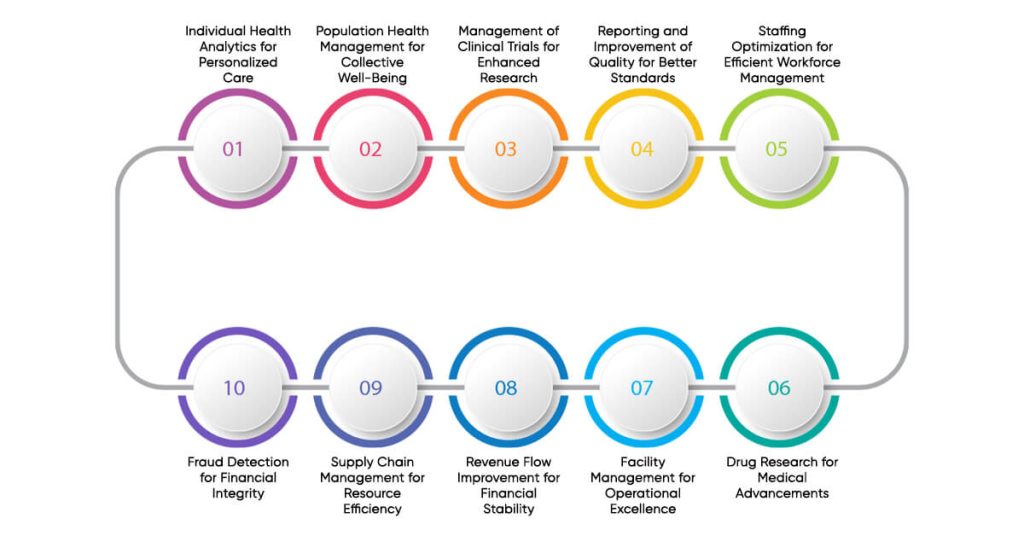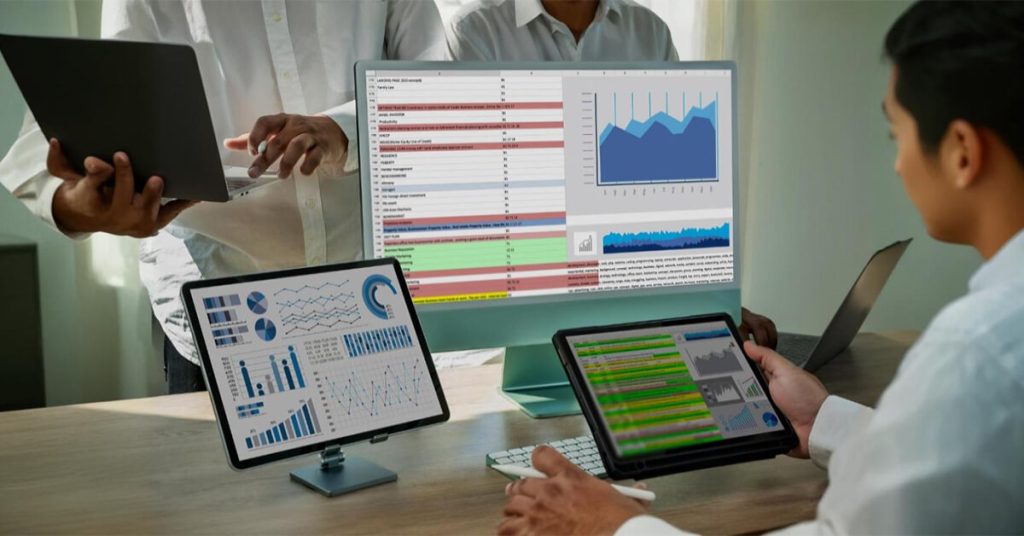Quick Summary
Introduction
The world of data awaits you—where every byte holds the power to transform lives, prominently in healthcare. Today, the modern healthcare industry depends on business intelligence (BI) to improve patient care and enhance hospital management. Also, BI has transformed the healthcare sector by helping doctors to make better medical decisions for healthcare providers and administrators.
Each second, hospitals and clinics accumulate massive data through the use of electronic health records (EHRs) as well as wearable health devices and smart medical technology (IoMT). However, data lacks value until professionals transform it into significant insights through proper analysis. Here, the use of business intelligence comes into action.
The implementation of business intelligence tools enables the prediction of disease outbreak prediction and hospital resource management as well as cost reduction. BI systems offer patients individualized healthcare guidance as well as faster booking options, which further reduces their waiting durations. Predictive analytics enables hospitals to stop unwanted re-admissions as well as enhance treatment designs that facilitate preventive medical care.
Whether you’re keen on learning the benefits of business intelligence in healthcare or want to understand how it is evolving the healthcare industry at a ground level, this article covers it all, defining the course of the future.
How BI Elevates Patient Care?
Picture a world where all healthcare decisions are data-driven—that’s just around the corner. Through enterprise business intelligence, hospitals and clinics are employing data to improve outcomes by using predictive analytics in healthcare. Here’s how:
- Early Diagnosis of Diseases: The evolution of clinical data analytics has already observed patterns that indicate disease before symptoms become apparent. A 2023 cumulative study of 7 effective intervention studies indicated that early intervention can reduce all-cause mortality in prediabetic patients by 17% and the incidence of retinopathy by 38%.
- Personalized Treatment Plans: Healthcare data analytics is encouraging treatment personalizations towards specific patient needs, meaning it’s not a one-size-fits-all anymore. Healthcare professionals equipped with business intelligence tools can make more informed choices. By leveraging patient information, they can tailor treatment strategies to individual needs. This facilitates a more precise method of diagnosing and managing patient care.
- Reduction in Medical Errors: Precise business intelligence metrics help identify irregularities within treatment processes, reducing medication errors significantly. This has been backed by research in which results prove that provider order entry systems decrease serious medication errors by 55%.
As the role of business intelligence in healthcare becomes increasingly acknowledged and documented, conversations are more about how business intelligence is vital for successful predictive models to save lives.
Benefits of Business Intelligence in Healthcare
Healthcare data analytics further allow data-based approaches to drive operational excellence in healthcare organizations. Optimizing healthcare operations not only adds to the bottom line but also indirectly powers enhanced patient care by ensuring well-prepared and resourced hospitals. With budgets succumbing to rising costs, a business intelligence framework becomes a necessity, offering benefits such as:
1. Optimized Staffing Levels
The number of qualified staff directly affects the smooth functioning of healthcare facilities. Past patient arrival data analyzed through Business Intelligence enables healthcare organizations to predict upcoming patient flows. The predictive analysis provided by Business Intelligence enables adequate staff management. This maximizes labor resources when patients are at their peak and minimizes staffing costs when patient activity is low.
Hospital operations become more efficient and healthcare workers stress is reduced when hospital staffs are properly scheduled. This means that healthcare institutions can reduce both employee workload (i.e., burnout) and unnecessary labor costs.
2. Optimized Usage of Resources
A well-structured business intelligence framework allows clinical institutions and hospitals to track critical supplies, reducing wastage while ensuring the supply is regular and sufficient. Hospitals use data for improved inventory control as well as to eliminate shortages and reduce waste. This further results in financial savings.
BI systems enable the analysis of future resource requirements, which improves healthcare providers’ ability to make purchasing decisions. Real-time monitoring lets healthcare institutions enhance their resource utilization and boost operational efficiency, which results in improved standards of patient care.
3. Better Revenue Cycle Management
Business intelligence tools enable healthcare organizations to improve the way they handle financial management tasks. BI connects data to electronic health records (EHR) and financial and billing systems, which provides a comprehensive analysis of the revenue process. BI tools support healthcare organizations by solving problems while decreasing insurance payouts and streamlining payment methods.
Real-time updates from BI systems on patient financial data let healthcare organizations forecast future earnings and detect potential financial losses. Because of this, their financial operations are improved. This results in better financial stability as well as improved efficiency of healthcare services.
4. Insurance Fraud Detection
Healthcare insurance fraud creates substantial annual financial damages for healthcare organizations. Do you know that U.S. healthcare expenditures are projected to increase by an average of 5.8% annually till 2024? Business Intelligence (BI) systems help organizations detect fraud early through their ability to use advanced data analysis that identifies unusual claim patterns.
Analytics based on large-scale healthcare transactions enable BI tools to unfold problems connected to duplicate claims, overcharging, or false diagnoses. Early detection through this system protects financial interests and maintains public rule compliance while promoting honest healthcare service delivery.
Want to improve patient care with BI benefits for your Healthcare organization?
Real-World Impact: Use Cases in Modern Healthcare

According to a recent Precedence Research report, the international healthcare business intelligence market is valued at $11.4 billion in 2025 and is predicted to hit around $35.72 by 2034—speeding at a CAGR of 13.52% between 2025 and 2034. That’s how enormous business intelligence in healthcare will be in the future. This explains the growing use of healthcare data insights, which can be practically understood through real-world implications. Here are some powerful use cases:
1. Individual Health Analytics for Personalized Care
Medical data analysis breakthroughs allow healthcare workers to provide individualized treatment by examining patient-specific health information. As an example, predictive analytics helps analyze information of patients (facing a high risk of developing diabetes) so they can receive early intervention. This enhances their health outcomes and reduces costs.
Do you know that the quality and cost of healthcare management now strongly depend on hospital readmission rates? Medicare of the U.S. confirms that it will spend almost $17 billion on the 20% of patients who return to hospitals for care within the first thirty days after release. Predictive analytics is effective in lowering the rate of patients returning to hospitals within 30 days.
Thus, the use of customized healthcare approaches has a meaningful effect on modern medical practices.
2. Population Health Management for Collective Well-Being
Data analysis through population health management helps communities track their health status for enhanced improvement. Healthcare providers detect risks and take corrective actions quickly by analyzing health records, insurance claims, and statistical registries. Additionally, predictive analytics tools can identify disease outbreaks that help healthcare providers to take immediate action. The application of big data enhances patient care results while minimizing healthcare costs.
Hence, through BI, healthcare service providers can examine large groups of data to capture and follow the health of entire communities to better customize specification interventions.
3. Management of Clinical Trials for Enhanced Research
Enterprise business intelligence plays an essential role in managing clinical trials because it creates an efficient system that produces clear results and leads to successful completion. The platform displays current data alongside trial-tracking functionality, which maintains adherence to established rules. Complex analytics processes allow organizations to produce efficient choices while maximizing resource use, minimizing errors, and accelerating research efficiency. The approach produces improved patient wellness along with new medical discoveries.
Therefore, enterprise business intelligence is essential in ensuring a streamlined clinical trial, enabling research to be conducted efficiently, in a transparent fashion, and directed at successful outcomes.
4. Reporting and Improvement of Quality for Better Standards
The process of quality reporting and improvement in healthcare is essential for maintaining high care standards. Healthcare providers achieve quick detection of problems through constant monitoring and feedback, which leads to necessary changes. It helps build standards of care and quick identification of areas in which improvement needs to be undertaken. The improvement process enhances patient outcomes while establishing an excellent standard of care in healthcare services.
5. Staffing Optimization for Efficient Workforce Management
Workforce analytics (a kind of data analytics technique) predict staff requirements by forecasting changing patterns in workload. The scheduling method prevents unnecessary staffing expenses while it ensures the available number of staff in busy periods. The overall resource management becomes more efficient through BI technology. It also reduces workforce fatigue and improves operational efficiency.
Data analytics assists healthcare practitioners in the optimized allocation of human resources, thereby alleviating burnout and ensuring quality care for patients.
6. Fraud Detection for Financial Integrity
The health fraud detection market worldwide reached USD 2.27 billion in 2024, expanding with a 12.44% annual growth rate from 2025 to 2034. This will also boost the market value to USD 7.33 billion by 2034. Health insurance claim fraud cases have increased and fuelled the expansion of the healthcare fraud detection market.
Advanced tools can detect inappropriate billing practices and other forms of suspicious claims, thus aiding in preventing fraud and ensuring compliance with regulations. These systems strengthen financial integrity through question-benefit claim analysis and also help healthcare providers follow standards while reducing financial losses and safeguarding patients from price gouging.
7. Supply Chain Management for Resource Efficiency
Data analysis in healthcare supply chain management supports the improvement of resource efficiency by enhancing demand forecasting as well as inventory management practices.
The system decreases supply waste, delivers on time, and avoids shortages. Healthcare organizations reach operational excellence and decrease expenses with reduced resource waste when they use predictive modeling to increase the efficiency of their operations and service delivery for patients.
Thus, data analysis optimizes inventory management, minimizing wastage and ensuring that essential medical supplies are always available.
8. Revenue Flow Improvement for Financial Stability
Through business intelligence solutions, healthcare organizations can examine income to detect claim denials that affect financial stability. Healthcare providers achieve better financial wellness through simplified business processes that subsequently increase their cash flow.
As per the article in the Financial Times, the use of TeleTracking (a technological solution) decreases waiting periods and discharging times, which results in enhanced operational efficiency for healthcare companies.
The implementation of patient care improvements and expense cost reductions enables healthcare organizations to maintain a steady financial standing throughout multiple years.
9. Facility Management for Operational Excellence
Through predictive analytics, maintaining relevant infrastructure for the hospitals, optimum space utilization, and enriched patient experiences are assisted. The smooth operation of hospital facilities depends on efficient data utilization, which enables prediction of maintenance requirements to keep hospital infrastructure operational at its best level.
The innovative analytical method optimizes hospital areas, thus reducing interruptions and improving patient satisfaction by streamlining healthcare operations and optimizing facility designs.
10. Drug Research for Medical Advancements
From data-driven insights, drug research development can be accelerated and the efficiencies of pharmaceutical research enhanced. Advanced analytical techniques enable medical data scientists to speed up the search for promising compounds and their predictions and clinical trial improvements. This leads to faster development times at a comparatively affordable price.
BI Tools to Navigate the Healthcare Technology Landscape
A flawless BI strategy is possible through a power-packed suite of technologies, each of which has gigantic paybacks to today’s healthcare ecosystem. The advanced healthcare BI tools revolutionizing the current medical solutions are:
- Integration and ETL Processes for Data: Integration tools are put to use for the large volumes of data used to efficiently extract, transform, and load data.
- Data Storage Solutions and Warehousing: Proper data management is prime. Hence, hospitals with robust storage solutions ensure Data Management in Healthcare will not pose a bottleneck.
- State-of-the-art Data Visualization and Reporting Tools: Applications that create dynamic reports and visual dashboards for professionals involved in health are a vital help toward seeing the complex data at a glance.
- Data Mining and Discovery: A modern algorithm that seeks to unearth patterns in this abundant source of crucial information empowers the provider to make many decisions before the fact.
- Artificial Intelligence and Machine Learning Applications: Big Data in Healthcare has funneled into applications that use AI to predict trends or personalize contexts for patients.
These business intelligence tools are just the gears spinning behind the scenes to ensure every bit of data serves the ultimate purpose of improving patient outcomes.
Looking for Improving Patient Care? Explore X-Byte’s Business Intelligence Services in Healthcare!
Roadblocks and Resolutions: Addressing BI Adoption Challenges

While the potential for healthcare data analytics is huge, it needs to address several underlying challenges. Compliance with these challenges will lead to the realization of the benefits of business intelligence in the healthcare sector. Planned and strategic investments can turn these hurdles into doors for opportunistic pathways to healthcare success. Take a look at the challenges:
- Data Quality and Standardization: High-quality data must be accurate and reliable to enable the business intelligence metrics to work effectively.
- Integration of Legacy Systems: Many institutions are still stuck with outdated systems, which makes it very difficult to implement modern BI frameworks.
- Data Privacy Compliance and Security: Several regulatory compliance requirements call for ongoing diligence.
Implementation. - Time and Cost: Budget constraints and integration complexity slow down the adoption process.
The Horizon Beckons: A Healthier Future with Data
At the confluence of technology and human care, business intelligence affords immeasurable potential in health care. This much is evident in the early detection of disease, operation excellence, and future trends: Healthcare is strongly leaning toward a data-driven environment, as by 2029, the healthcare analytics market (globally) will reach US$ 133.19 billion. The journey from raw data to business intelligence metrics and actionable insights is setting a benchmark in patient care and efficiency all around the world.
The revolution is not merely in adopting the latest healthcare business intelligence tools but rather in setting up a culture where every decision is informed by healthcare data insights. The discussion of enterprise business intelligence solutions is trending between academic professionals and their industry counterparts, but the disruptive power that big data in healthcare holds is an undisputed one. Here, at the epicenter of this transformation, is healthcare data analytics, ushering in a new era of data-driven healthcare that will redefine patient care forever.
With the benefits of business intelligence in healthcare and the recent advancements in the field, if you want to keep up with what is happening, now is the time to acclimatize yourself with the new technologies. The role of data in contemporary healthcare settings is unequivocal proof that enhancing patient experience with BI is no longer a dream but has become a reality through predictive Analytics in Healthcare.
Want to Build a Healthier Future with Data Explore our Healthcare Data Analytics Services Now!
Conclusion
The answer for all healthcare professionals, decision-makers, and techies out there asking how business intelligence is used in healthcare is—by using big data in healthcare responsibly and efficiently to help save lives and optimize medical processes. The road to a healthier future is clear, with proven trends and real-life examples backing the benefits of business intelligence in healthcare.
If you are ready to embrace the data wave towards the change in healthcare, partner with us at X-Byte to elevate patient care and optimize your healthcare operations to excellence. Connect today to leverage the best of our ingenious solutions!






